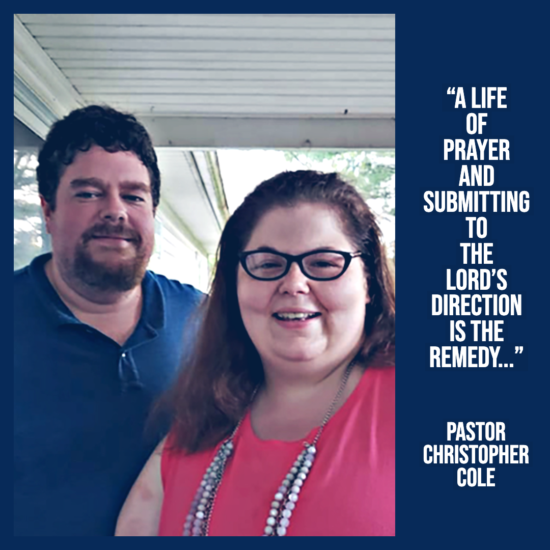What To Do When Facing Difficult Situations 
There is much that I have learned in my nearly ten years of pastoral ministry, but one constant is that difficult situations are to be expected with the calling of being a pastor. They could be something environmental, something within the culture of the church or in the community. They could be due to the pastor doing or not doing something, saying or not saying something. They could come about by some combination of these, or even something else completely. At times, you can see them coming, such as having a board meeting you might be dreading. Other times they might just seemingly appear out of nowhere, like a family getting upset you didn’t visit their mother’s sister’s uncle’s daughter in the hospital when nobody told you they were there. I am fairly certain that I’ve experienced every one of these and maybe a few other situations too. How then do we discern them?
Godly Counsel
The Book of Proverbs gives many pithy sayings concerning wisdom and good, Godly counsel. These are often associated with “life”.
The Book of Psalms also begins with “How blessed is the man who does not walk in the counsel of the wicked, Nor stand in the path of sinners, Nor sit in the seat of scoffers!” (Psalm 1:1 NASB)
Throughout Scripture we are introduced to characters such as King Saul and King Josiah. Saul had initially listened to the counsel of the prophet/priest and former judge over Israel Samuel. However, when he became impatient and decided to perform the duties of a priest rather than wait for Samuel, he was informed that the kingdom God gave him was now given to a man after His heart. Things however went from bad to worse when King Saul spared Agag, king of the Amaleks, despite what Samuel told him. From that time on Samuel and Saul would not speak again.
King Josiah provides another interesting lesson for us. He became the king over Judah at the age of eight. The people he surrounded himself with read like an all-star ballot of Godly counselors: Hilkiah, the high priest who found the scroll of Moses (specifically Deuteronomy) that was hidden away during the reigns of Manasseh and Amon, along with his son Jeremiah, the prophet who warned of the impending destruction of Judah; there was Shaphan the scribe and his son Ahikam; and by Shallum the chamberlain and his wife Huldah, the prophetess. Under Josiah’s rule, not only had the Temple been restored and the book of the Law rediscovered, but a national revival had taken place.
Yet even Josiah succumbed to a selfish desire after having built up Judah’s armies and witnessed the crumbling of the Assyrian Empire. He wanted to reunite what was left of the Kingdom of Israel with Judah under his reign. However, Pharaoh Necho II of Egypt wanted to put an end to the Assyrian Empire and requested safe passage through Judah to do so. Josiah, despite the prophet Jeremiah’s warnings, opposed the pharaoh and was eventually mortally wounded and died.
However, if there is one story in Scripture that places counselors at (or at least near) the center, it’s the story of Job. That is a story that shows us that having others to talk to when going through difficult and trying circumstances is a good thing, it matters who we surround ourselves with. Job’s three “comforters” (Eliphaz the Temanite, Bildad the Shuhite, Zophar the Naamathite) weren’t listening to Job, and had all manner of advice that didn’t help. Yet there is a fourth comforter who comes along (Elihu the Buzite), much younger than the others, who none the less rebukes Job for vindicating himself, as well as the other counselors for giving bad advice. We need people to give us counsel that won’t simply tell us what we want to hear yet speak God’s truth. We also need to put our pride to the side and heed the voice of God when He is speaking.
Prayer
It should go without saying that pastors should be praying. In fact, that should go without saying for anyone who is a Christian. We even learn in Sunday School as kids, “Read your Bible/Pray every day/And you’ll grow … Neglect your Bible/Forget to pray/And you’ll shrink …” How many of us though really take the time to pray through everything?
In Matthew 17:14-21 Jesus is approached by a man whose son is possessed, and there is nothing he can do about it. He even brought his son to Jesus’ disciples hoping they could cast out the demon yet were unable to. So out of desperation the man came to Jesus and explained what was going on. After a few remarks about the unbelief of the disciples, Jesus commanded the demon to come out of the boy, and he was cured.
When the disciples asked later why they were unable to cast out the demon, Jesus revealed that they not only had a lack of faith, but that prayer (and fasting) was required to remove that demon. Interestingly enough, Jesus simply commanded the demon to come out of the boy. He didn’t pray the demon out. Jesus’ life though was a life of prayer. He didn’t simply wait for a difficult situation to go to the Father, He was constantly praying.
As I look at that passage more closely, I sometimes see myself like the disciples. It’s not that I don’t believe or have faith in the Lord and what He is capable of doing, but sometimes I have a bit too much faith in whatever ability I have. A life of prayer and submitting to the Lord’s direction is the remedy for that.
Rely on the Holy Spirit
In the animated adaptation of Pinocchio, Jiminy Cricket serves as the conscience of the marionette brought to life. When Pinocchio doesn’t listen to Jiminy, he ends up putting himself and others in harm’s way.
The Holy Spirit may not be an anthropomorphic grasshopper who wears a top hat, vest and coat, but I wonder if we treat Him as such at times. It’s at this point we need to be reminded He is more than simply our conscience that, if we were to heed, would find that it is easier to navigate difficult circumstances that arise, and perhaps avoid the ones of our own making. The question, I believe, that needs to be asked is, “Do we have a strong enough theology of the Holy Spirit?”
In our country we have stories of self-reliance and determination. We celebrate those who “pulled themselves up by their bootstraps” and made something out of themselves from little. We tend to admire the image (not the product) of “The Marlboro Man”, the tough, no nonsense cowboy/rancher who brings order to wild lands. The Holy Spirit, however, calls us away from that. He makes us fully dependent on God (not that we weren’t already, but certainly makes us aware of that). He gives us the very mind of Christ (1 Corinthians 2:10-12, NASB), which brings discernment into situations that we could not gain on our own.
Not only that, but the Holy Spirit also gives us the power to act as Jesus would. When I was a kid growing up in youth group, the “WWJD” fad hit. I’ll admit (somewhat reluctantly) that I got into it too. It’s not enough to simply ask “What Would Jesus Do?”, but we need to actually do it. Without the Holy Spirit’s activity in our life, and our submission to His activity, we can’t. Although it might at times be difficult to admit we are dependent on the Holy Spirit, that He is more than just a talking cricket with some good advice. He is the very power of Christ in us.
Final Thoughts
I hope that in the above article I have laid out some ways to navigate difficult circumstances. Most of these I have learned from personal experience, and sometimes it took me multiple times to learn. There are just a couple things I want to finish up with, so bear with me.
The first is none of these will keep us from experiencing difficulty. The world is still full of people, and while Christ’s kingdom has been initiated, it hasn’t been culminated yet. We’re also still human, and though we have been set free from the power of sin and have been given the Holy Spirit, there will be times we will make mistakes (though that won’t be our intent). When we deal with other humans there will be difficulty, misunderstanding, hurt feelings, anger, bitterness, resentment, etc. It is my hope that whenever this happens, remembering the advice given above helps you navigate through that.
The second thing is when dealing with difficulty, there are three sides: one person’s (or group’s), the other person’s (or group’s), and somewhere in between is the truth. Sometimes that’s easy to see when we are afforded the luxury of being “objective”, but not always easy if the difficulty is of our own contribution. Either way, we need to demonstrate humility and listen for what God is saying to us in those times, and then applying what He’s saying and leading us to do.
I hope you have found the content above helpful as you navigate your way through difficulty.
About the Author
Christopher Cole, born on December 21, 1983, currently serves as an ordained elder in the New South Conference at Forrest Chapel Free Methodist Church in Westmoreland, Tennessee. He began as a licensed pastor in the Genesis Conference at Brooklyn FMC of East Otto, New York (nowhere near the more famous Brooklyn, NY), and also served Dansville FMC. He has been married to Sandy Buffy Cole since March 21, 2010. Christopher is also a percussionist who plays a little bit of guitar and is trying to learn the mandolin as well. He loves model railroading and writing.
